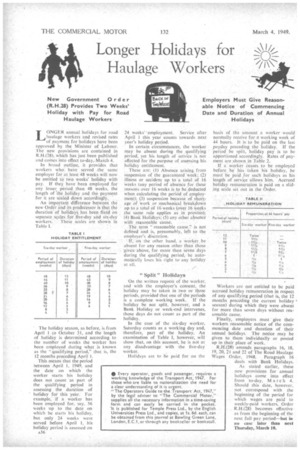Longer Holidays for Haulage Workers
Page 26

If you've noticed an error in this article please click here to report it so we can fix it.
New Government Order (R.H.28) Provides Two Weeks' Holiday with Pay for Road Haulage Workers Employers Must Give Reasonable Notice of Commencing Date and Duration of Annual Holidays
LONGER annual holidays for road haulage workers and revised rates of payment for holidays have been approved by the Minister of Labour.
he new provisions are contained in R.1-1.(28), which has just been published and comes into effect to-day, March 4.
In broad outline, it provides that workers who have served the same employer for at least 48 weeks will now be entitled to two weeks' holiday with pay. If they have been employed for any lesser period than 48 weeks, the length of the holiday and the payment for it are scaled drown accordingly..
An important difference between the new Order and its predecessor is that the duration of holidays has been-fixed on separate scales for five-day and six-day workers. . These scales are shown in Table I.
• The holiday season, as before, is from April 1 to October 31, and the length of holiday is determined according to the number of weeks the worker has been employed during what is known as the "qualifying period," that is, the 12 months preceding April 1.
This means that the period between April 1, 1949, and the date on which the worker starts his holiday does not count as part of the qualifying period in assessing the duration of holiday for this year. For example: if a worker has been employed for, say. 36 weeks up to the date on which he starts his holiday, but only 24 weeks were served before April 1, his holiday period is assessed on
A36 24 weeks"employment. Service after April 1 this year counts towards next year's holiday period.
In certain circumstances, the worker may be absent during the qualifying period; yet his length of service is not affected for the purpose of assessing his holiday entitlement.
These are: (I) Absence arising from suspension of the guaranteed week; (2) illness or accident Up to*a total of 16 weeks (any period of absence for these reasons over 16 weeks is to be deducted when calculating the period of employment); .(3) suspension because of shortage of 'work or mechanical breakdown up to a total of 16 weeks (over 16 weeks the same rule applies as in proviso); (4) Bank Holidays; (5) any other absence with reasonable cause.
The term "reasonable cause 7 is not defined and is, presumably, left to the employer's discretion.
If, on the other hand, a worker. be absent for any reason other than those given 'above, for more than seven days during the qualifying period, he automatically loses his right to' any holiday at all.
"Split" Holidays On the written request of the worker, and with the employer's consent, the holiday may be taken in two or three periods, provided that one of the periods is a complete working week. If the holiday be not split, however, and a Bank Holiday or week-end intervenes, those days do not count as part of the holiday.
In the case of the six-day worker, Saturday counts as a working day and, therefore, part of the holiday. An examination of Table 1, however, will show that, on this account, he is not at any disadvantage with the five-day worker.
Holidays are to be paid for on the basis of the amount a worker would normally receive for a working week of 44 hours. lt is to be paid on the last payday preceding the holiday. If the 'period be split, holiday pay is to be apportioned accordingly. Rates of payment are shown in Table 2.
If a worker ceases to be employed before he has :taken his holiday, he must be paid for such holidays as his length of service allows him. Accrued holiday remuneration is paid on a sliding scale set out in the Order.
Workers are not entitled to be paid accrued holiday remuneration in respect of any qualifying period (that is, the 12 months preceding the current holiday season) during which they were absent for more than seven days without reasonable cause.
Finally, employers must give their workers reasonable notice of the commencing date and duration of their
annual holidays. The notice may be•given to them individually or posted
up in their place of work.
R.H.(28) amends paragraphs 16, 18. 19, 20, 21 and 22 of The Road Haulage Wages Order, 1948. Paragraph 16 deals with Bank Holidays.
As stated earlier, these new provisions for annual holidays come into effect from to-day, March 4. Should this date, however, not correspond with the beginning of the period for which wages are paid to weekly-paid workers, Order R.H.(28) becomes effective as from the beginning of the next full pay period—but in no ease later than next Thursday, March 10.


























